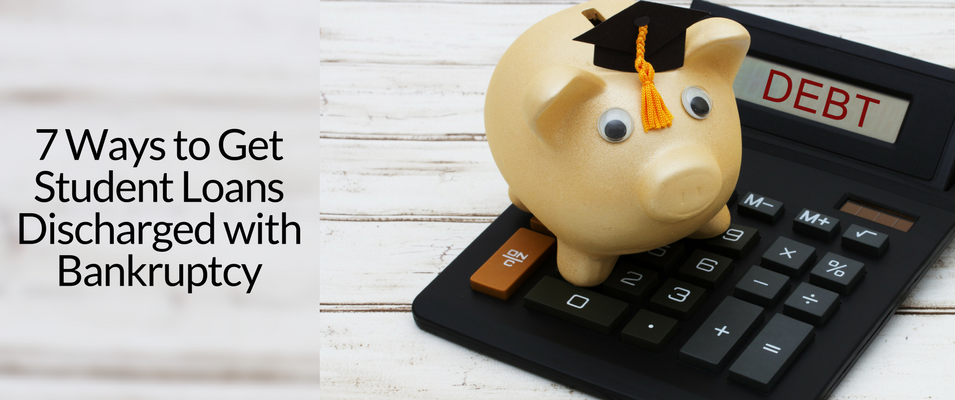Many people believe that if they file for bankruptcy, all of their debts will vanish. That sounds like a pretty exciting prospect when you are still loaded down with tens of thousands of dollars in student loans! Unfortunately, it’s just not the truth. In most cases, student loans are actually excluded from a Chapter 7 bankruptcy filing – the type that involves a total discharge of unsecured debts.
Student loans can be included in a Chapter 13 filing, which restructures debt with a payment plan the filer can afford. Under Chapter 13 bankruptcy, all debts are combined, and a monthly payment is divided amongst the creditors. The payment plan lasts for a set time, after which the debts are discharged. Many people can pay less toward their student loans with a Chapter 13 debt restructuring.
There are ways to get your student loans discharged, but it is very difficult. You will need to work with an experienced Phoenix bankruptcy lawyer to explore your options. Here are seven instances in which you might be able to get your loans discharged:
1. Undue Hardship
The only way to have student loans discharged through bankruptcy is to show that paying them poses an “undue hardship.” Proving this is extremely difficult, and these attempts are rarely successful. It is essential to work with a bankruptcy lawyer if you want to make this claim.
You will have to show that you have made good faith efforts to pay back the loan and that you would not be able to sustain a minimum standard of living if you kept paying on the loan. In addition, you must show that you will continue to suffer financial hardship for the foreseeable future. it can be very difficult to prove undue hardship, which is why working with a lawyer is essential. An experienced bankruptcy lawyer will know how to make the strongest case with the most likelihood of success – though that doesn’t guarantee results.
2. The School Closed
A lot more people are attending school online these days because it gives them the flexibility to work and pay for some of their living expenses or take care of their family. But a lot of online schools come and go because they are not proven through the test of time. You could enroll in a school, and it could close mid-semester or even shortly after you complete your program.
If a school for which you have been given a student loan closes – whether it’s an online school or not – you may be able to discharge your student loan. You must have been enrolled in the school within 120 days of its closing. That’s a very short window, so it’s unlikely that very many people will be able to discharge their loans under this rule.
3. School Fraud
A “borrower defense discharge” is available to students who can show that their schools defrauded them by using illegal or deceptive strategies to convince them to attend the school and to take out student loans. For example, the school may have made unrealistic promises about job or income prospects after graduation, or it may have lied about costs.
Getting a discharge under this rule will require working closely with an attorney and getting plenty of evidence to prove the deception or illegal activity. You will need correspondence with school officials, promotional materials, course catalogues, transcripts, and other items.
4. False Certification or Fraud
Schools should do their due diligence to certify you as eligible for student aid, but they don’t always get it right. If you did not meet the requirements for the student loan but the school certified you anyway (either intentionally or not), those student loans can be discharged. Another example of false certification would be if you were given loans to train in a program that you can’t get employment in – such as if you have a criminal record so can never become a preschool teacher or you have a physical handicap that would prevent you from becoming a massage therapist. Your school should not certify you for loans under such circumstances.
You may also qualify for a student loan discharge if the school signed your name on a promissory note or if someone else took out a loan on your behalf (identity theft).
5. Unpaid Refund
Sometimes, the school has to pay a refund on a student loan to the government or to the borrower. An example would be if the loan was for more than the tuition amount. The school can’t just pocket that money. It is supposed to pay back the balance.
If your school did decide to keep that extra, you may be able to have the amount reduced from what you owe. You won’t get a total discharge, but you will get a bit knocked off the top, which can still help.
6. Disability
You may get into a serious accident that leads to a permanent or total disability, making it difficult or even impossible for you to work. Whether you suffer this disability while you are in school or years later, you may be able to have your student loans discharged as a result. You must submit documents from the Department of Veterans Affairs, show that you are receiving Social Security Disability, or have a note from your doctor saying that you have been disabled for at least 60 months and will be for another 60.
Again, it is important that you work with an attorney to make this claim successfully.
7. Death
Hopefully, you won’t have to die to get debt relief. However, it may help with your estate planning to know that if you die, your family won’t be burdened with your student debt as it will be discharged. Similarly, if your spouse or someone else for whom you would be responsible for their debts dies, you can rest easy knowing that student loans won’t be added to the list.
Getting your student loans discharged isn’t easy, but there are some exceptions where it’s possible. At Phoenix Bankruptcy Lawyer we will explore all your options. Our experienced and skilled attorneys will explore all the legal options to help you get the debt relief you need so you can start taking back your finances. We can also help you file for bankruptcy in Phoenix to discharge or reduce some of your debts to free up more money to pay back what you owe. Call us in Arizona to learn more.
Published By:
Phoenix Bankruptcy Lawyer
668 N. 44th St., Ste 300
Phoenix, AZ 85008
Hours: Mon – Fri: 9am – 5pm
Phone: 480-263-1699
Email: info@phoenixbankruptcyattorney.co
Website: http://phoenixbankruptcylawyer.co




